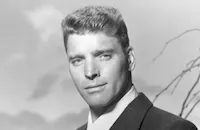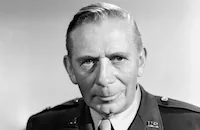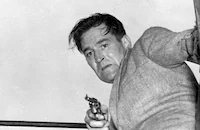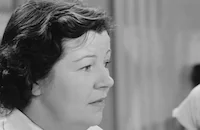Vengeance Valley

Brief Synopsis
Cast & Crew
Richard Thorpe
Burt Lancaster
Robert Walker
Joanne Dru
Sally Forrest
John Ireland
Film Details
Technical Specs

Synopsis
After returning from a cattle drive, Colorado ranch foreman Owen Daybright and his foster brother, Lee Strobie, learn that unmarried Lily Fasken is about to give birth. Owen then goes to Lily's house alone and finds that Lee's wife Jen and Lily's visiting brother Dick are the only people who will help her. Owen secretly gives $500 to Lily, who gratefully accepts the money. Before he leaves, Jen asks Owen who the father is, but he will not say. Dick suspects Owen and promises to get to the truth, but Jen defends Owen. At the local saloon, as Lee thanks Owen for getting him out of another scrape, Dick comes gunning for Owen after learning about the $500. Sheriff Con Alvis stops the altercation, further increasing Dick's hatred. At the Strobie ranch, Owen and Lee fondly talk with Lee's crippled father Arch, who took Owen in fifteen years before and favors him over Lee. Although Owen privately tells Arch that Lee is now capable of being ranch foreman and he should move on, Arch convinces him to stay. Some days later, Hub, Lily's other brother, arrives in town. At Mrs. Burke's ranch, where Lily now works, Hub asks his sister if she wants to marry Owen, but she says no and insists that she does not need Hub's help. A few minutes later, Owen and Hewie, one of the ranchhands, arrive at Mrs. Burke's to arrange to include her cattle on their next drive. Inside the house, Lily privately talks with Owen and says that she feels guilty over Jen, but will never tell her. Meanwhile, Dick and Hub force Hewie at gunpoint into a shed, and when Owen walks outside, Hub and Dick confront him. Because Owen is unarmed, he and Hub begin a fistfight. A shotgun-carrying Mrs. Burke and Lily break up the fight and promise to hold Hub and Dick for the sheriff. At the Strobie ranch, Arch good-naturedly chides Lee about withdrawing $500 in gold from his checking account, making Jen realize that, as she had suspected, Lee is the father of Lily's child. Later, in their bedroom, Lee tries to blame Owen, but Jen calls him a liar and storms out. When Jen sees Owen, she tells him that she now hates Lee and is leaving, but Owen reminds her how fond she is of Arch, and she agrees to stay. Owen subsequently tells Lee about Dick and Hub and warns that they will eventually find out the truth. He also advises Lee to take his last chance with Jen and leave, but Lee slaps him, accusing Owen of wanting the ranch all for himself. Lee then apologizes and the two laugh off their disagreement. A few days later, Lee convinces his father that he has matured and should be half-owner of the ranch. Arch agrees, then off-handedly says that after he dies, his own half of the ranch will go to Owen. Later that same day, Owen, Hewie and Lee track a few head of rustled cattle to Herb Backett's place. After Backett denies knowing anything, he and Owen start to fight, as Lee looks on from a distance. Hewie shoots a broken bottle out of Backett's hand, and when Owen finally wins the fight, he takes four of Backett's steer to replace theirs. While Hewie and Owen ride ahead with the cattle, Lee offers to pay for them, and Backett agrees, but says that he still needs to "settle" with Owen. At a dance the night before the spring drive, Owen stays in the bunkhouse because his wound from the fight with Backett has opened up, and Jen goes to tend him. Finding them together, Lee brutishly lashes out at Jen and tries to kiss her, then accuses her of having an affair with Owen. Although Lee later apologizes to Owen, he secretly visits Backett and devises a plan to have Dick and Hub represent him on the Eastern part of the cattle drive, which Lee will head, then, when the herds meet, have them ambush and kill Owen, who will head the Western drive. As the drives move forward, Hub and Dick arrive on the Eastern side looking for jobs. Lee acts as if he does not want them, but says that he cannot deny a rightful owner, Backett, from hiring whomever he wants. One night, Lee suggests to Texas cattleman Dave Allard that he buy the 3,000 head of Strobie cattle. Dave rides ahead to arrange to have the money wired to cover his check, and stops briefly at the Western herd. There he tells Owen about the sale, wondering if it is all right. Owen hides his anger against Lee and tells Dave that the sale is completely legal, but later confides in Hewie Lee's underhanded plan to cheat Arch. As the two drives converge, Owen rides over to Lee and asks him to tell Dave that the deal was a mistake, but Lee shrugs off his words. The next day, Hewie tells Owen that he has seen Hub and Dick among Lee's crew. Minutes later, Lee rides up and apologizes for his rashness and asks Owen to ride with him to tell Dave that the deal is off. Owen reluctantly agrees and the two men leave together. On the ride, Lee tells Owen that he is planning to leave the ranch and start fresh somewhere else, and the two reminisce about old times. While they are talking, Hub and Dick, who have been hiding among the rocks, shoot at Owen, and Lee gallops away. Hearing gunfire in the distance, Hewie organizes some men to ride toward the shots. As a wounded Owen, Dick and Hub shoot at each other, Hewie and the others arrive and quickly kill the two brothers. Owen then grabs his horse and goes after Lee, whom he confronts at the river. Lee reminds Owen that he has always been able to outdraw him, but this time Owen is faster and kills Lee. Back at the ranch, Owen tells Arch what happened, and Arch blames himself for not admitting what Lee was. When he sees Jen, Owen says that he wants to break the news to her himself.

Director

Richard Thorpe
Cast

Burt Lancaster

Robert Walker

Joanne Dru

Sally Forrest

John Ireland

Carleton Carpenter

Ray Collins

Ted De Corsia
Hugh O'brian

Will Wright
Grace Mills
James Hayward
James Harrison
Stanley Andrews

Glenn Strange
Paul E. Burns
Robert E. Griffin
Harvey Dunn
John Mckee
Tom Fadden

Margaret Bert
Norman Leavitt

Dan White

Bob Wilke
Louis Nicoletti
Monty Montague
Al Ferguson
Roy Butler
Crew
Malcolm Brown
Reggie Callow
Richard Farnsworth
George J. Folsey
Cedric Gibbons
James Gooch
Sydney Guilaroff
Henri Jaffa
Rudolph G. Kopp
Nicholas Nayfack
Conrad A. Nervig
Walter Plunkett
Irving Ravetch
Douglas Shearer
Alfred E. Spencer
William J. Tuttle
Edwin B. Willis

Photo Collections
Film Details
Technical Specs

Articles
Vengeance Valley
Burt Lancaster was still in the early phase of his film career when he took over the starring role in Vengeance Valley, a role described as "a typical John Wayne part," one given over to uncomplicated good guy heroics. Lancaster's apparent ease in the saddle and his rough hewn, rawhide appearance demonstrated he was perfect for the Western genre. Still, he had a few critics; twenty years later veteran stuntman Gil Perkins commented on his horsemanship in Vengeance Valley: "He can ride a horse pretty good now, but at first he was fairly weak at this." Obviously, the actor greatly improved his equestrian skills because a quarter of his career would eventually be devoted to the Western.
Vengeance Valley was shot on location just outside Canyon City, Colorado and Lancaster's co-star on the picture was Robert Walker, playing the part of his wayward foster brother, Lee. Walker walked onto the set with an already controversial reputation; he had been institutionalized for several nervous breakdowns, arrested on one occasion for being drunk and disorderly, and was recently divorced from a turbulent six weeks-long marriage to Barbara Ford, daughter of director John Ford. Because of his acrimonious split with Ford, there was considerable tension on the set of Vengeance Valley between Walker and co-star Joanne Dru, who was a close friend to Barbara Ford. As a result, Dru was not inclined to socialize with Walker after the cameras stopped rolling, nor was co-star John Ireland, who was married to Dru. But the on-screen chemistry between Walker and Lancaster was dynamic and the two became fast friends off camera. The New York Times even noted in its review of the film that "Robert Walker plays the wastrel with almost as much authority as Lancaster does his protector." In some ways, Walker's performance as the rebellious, self-destructive Lee was a warm-up for his next role as the murderous Bruno in Strangers on a Train (1951), directed by Alfred Hitchcock. Unfortunately, except for the latter film and 1945's The Clock (opposite Judy Garland), Walker's potential was never truly tapped and he died at 32 after performing in only two more pictures.
Film buffs take note. Be on the lookout for the actor who plays Dick Fasken in Vengeance Valley; it's none other than Hugh O'Brian who became a household name four years later as the title character in the long-running Western TV series, The Life and Legend of Wyatt Earp (1955-1961).
Producer: Nicholas Nayfack
Director: Richard Thorpe
Screenplay: Irving Ravetch
Art Direction: Malcolm Brown, Cedric Gibbons
Cinematography: George Folsey
Editing: Conrad A. Nervig
Music: Rudolph G. Kopp
Cast: Burt Lancaster (Owen Daybright), Robert Walker (Lee Strobie), Joanne Dru (Jen Strobie), Sally Forrest (Lily Fasken), John Ireland (Hub Fasken), Carleton Carpenter (Hewie), Ray Collins (Arch Strobie), Hugh O'Brian (Dick Fasken), Ted de Corsia (Herb Backett).
C-83m. Closed captioning.
By Scott McGee

Vengeance Valley
Quotes
Trivia
Notes
Actor Carleton Carpenter, as his character, "Hewie," provides intermittent voice-over narration during the film. Luke Short's novel was serialized in The Saturday Evening Post (3 December 1949-14 January 1950). According to Hollywood Reporter production charts and reviews, much of the film was shot on location in Canon City, CO, which was also the site of the film's premiere. An unsourced and undated, but contemporary newspaper article on the film noted that it was also shot on location at Coal Creek and Oak Creek, CO. Burt Lancaster was borrowed from Wallis-Hazen, Inc. for the film, which marked his first appearance in a Western. Vengence Valley also marked the final M-G-M film for actor Robert Walker, who had appeared in many popular M-G-M films during the 1940s. For additional information on Walker, who died in 1951, see entry above for his final film, My Son John.















